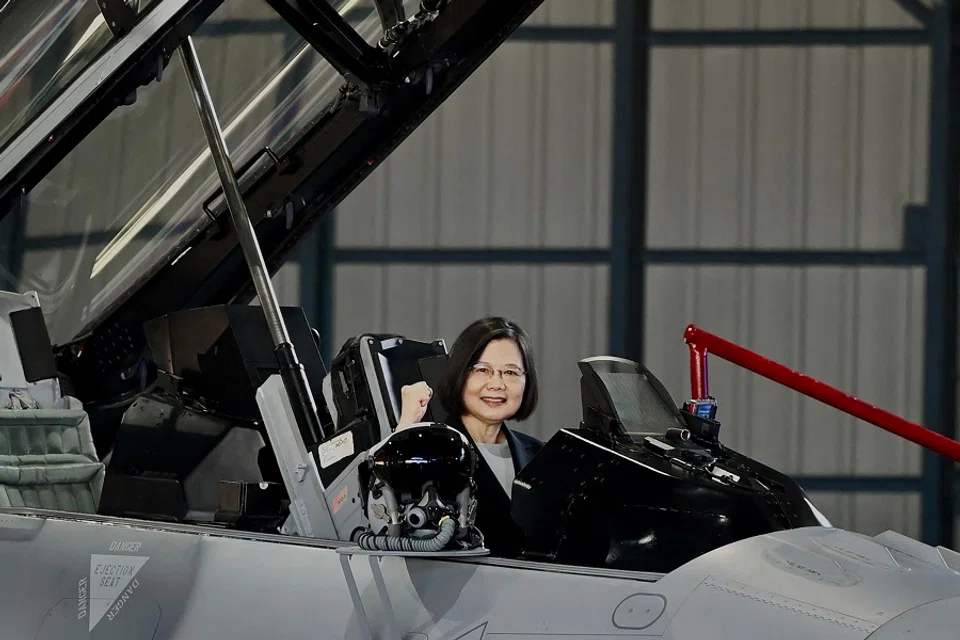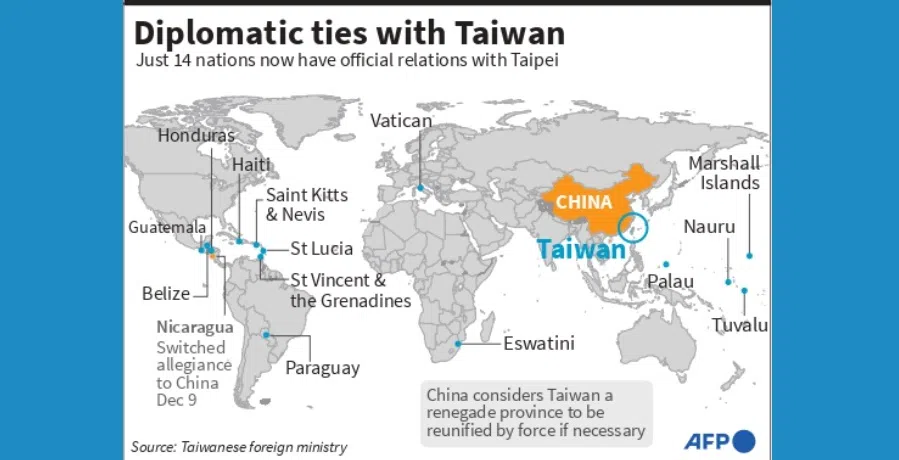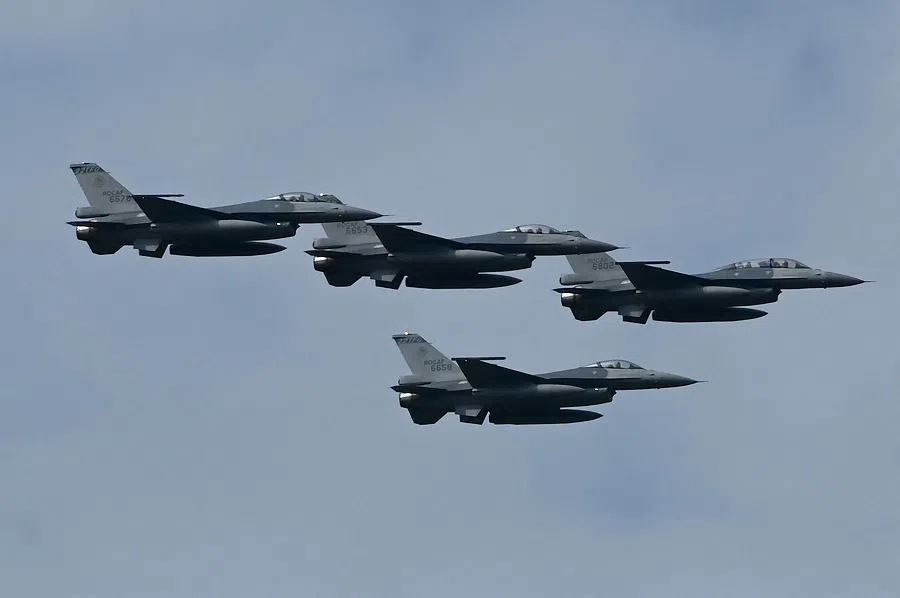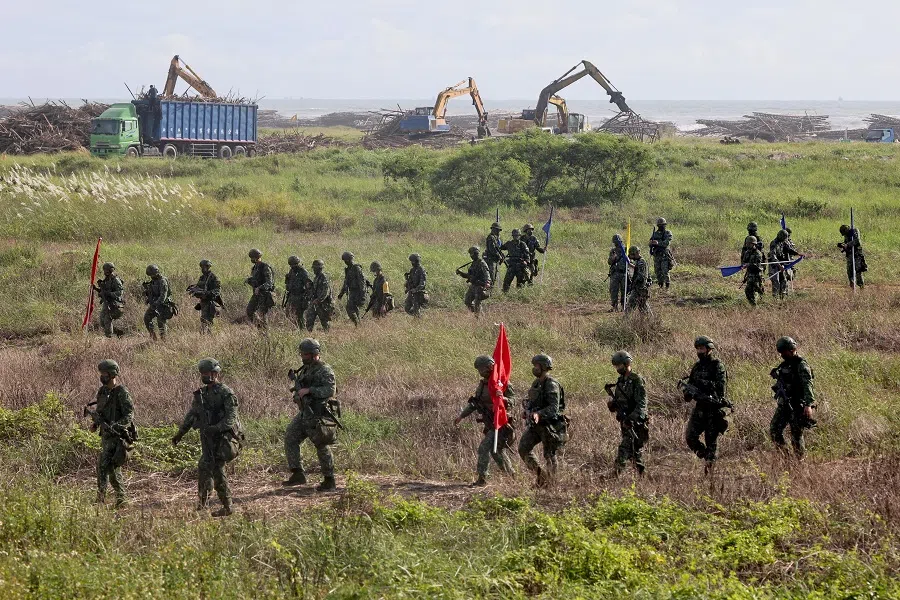Why Taiwan is unperturbed about Nicaragua cutting ties and switching allegiance to Beijing
Zheng Weibin notes Taiwan's unperturbed response to Nicaragua switching its allegiance to Beijing, the eighth such reversal since President Tsai Ing-wen took office in 2008. In his analysis, the US in practice treats Taiwan differently, despite its purported adherence to the "one China" policy and is swaying others to do so. In light of such support, there is no need for Taiwan to chase after symbolic diplomatic recognition.

During the Summit for Democracy convened by US President Joe Biden, Nicaragua renounced diplomatic ties with the Republic of China (ROC) and re-established diplomatic relations with the People's Republic of China (PRC). This means that following Tsai Ing-wen's ascension to the top post in Taiwan, the ROC has lost eight diplomatic allies in six years, leaving it with only 14.
The timing of the move by Beijing and Nicaragua is undoubtedly retaliation for the US's support of Taiwan, and the strengthening of ties with Taiwan by certain European countries. And Beijing's timing is very often based on whether there is a need to make its stand using such means under existing circumstances.
However, it is worth pondering how much actual value or significance the move by Beijing has. As some in the mainland Chinese media pointed out, reducing the number of countries that have diplomatic ties with Taiwan to zero is but a matter of time. Even if Taiwan had no more diplomatic allies left, would that mean it has no more space to manoeuvre in the international community, and has no choice but to opt for reunification with the mainland?
More about symbolism than substance
Of course not. Therefore, such moves from Beijing are more about symbolism than substance. Instead, what is more important for China to consider is how it should counter the support that Europe and the US have shown Taiwan, and their evolving relations with the island. In particular, the US is enhancing both political and military ties with Taiwan as Sino-US relations worsen due to greater rivalry between both countries.

As it is, the US is selling more weapons to Taiwan, and more of its military planes and vessels are navigating through or being deployed to the region. At the same time, the US has kept altering its interaction guidelines with Taiwan and allowed more senior government officials to visit the island. In a sense, the US is taking concrete steps to hollow out its "one China" policy, even though the White House is forever claiming that its actions are in line with the policy. So, what is the reality? The US would know best.
...the US government prioritises adherence to the Taiwan Relations Act (TRA) over the communiques in its actions.
In the 1972 and 1979 joint communiques, the US government stated that it recognised that there is only one China in the world, and that Taiwan is a part of China. Following this, in the 1982 joint communique, it reiterated that it had no intention of pursuing a policy of "one China, one Taiwan" or "two Chinas".
But how is the US government of today treating the mainland and Taiwan? First, the Biden administration has reintroduced values-based diplomacy, and used its modus operandi of power and democracy to differentiate between the two. At the same time, its secretary of state, Antony Blinken, has unequivocally backed the return of Taiwan to the United Nations system. This obviously differentiates and segregates Taiwan from the mainland, even though the US government continues to choose its words carefully.
Additionally, when dealing with cross-strait relations, the US has insisted all along that its domestic legislation supersedes the three Sino-US joint communiques. As such, the US government prioritises adherence to the Taiwan Relations Act (TRA) over the communiques in its actions.

Furthermore, as Sino-US relations grew more tense, the US Congress enacted the Taiwan Travel Act, Taiwan Assurance Act, and Taiwan Allies International Protection and Enhancement Initiative (Taipei) Act in addition to the TRA. By enacting such legislation, the US is effectively hollowing out its "one China" policy and developing quasi diplomatic relations with Taiwan. This may cause its allies to follow suit. For example, there has been talk of the ruling Liberal Democratic Party in Japan launching a Japanese version of the TRA.
This being the case, does Taiwan still need to care about how many diplomatic allies it has? That is precisely why after Nicaragua announced that it was re-establishing diplomatic relations with the mainland, it did not kick up a major fuss.
While this may cause some to criticise the ruling Democratic Progressive Party in Taiwan for doing nothing or not giving sufficient regard to the matter, it is also worthwhile considering from another point of view whether the party has decided to abandon such diplomatic competition. Under the leadership of Chen Shui-bian, Taiwan engaged in "scorched earth" diplomacy with the mainland and the outcome was clear for all to see. Taiwan is aware that it is no match for the mainland on this front.
The real threat to Beijing is when the US increasingly does not shy away from substantive exchanges with Taiwan, and Taiwan no longer concerns itself with the number of diplomatic allies it has, nor formally seeks independence.
Taiwan has its allies to count on
With substantive support from the US and its allies, the fact is Taiwan no longer has to bother about such matters of form. Since the US is using salami-slicing tactics and taking concrete steps to further its relations with Taiwan, Taiwan no longer needs to concern itself in this regard. The behaviour of the US, Taiwan, and certain European countries in recent times better illustrate the problem that Beijing faces.

The real threat to Beijing is when the US increasingly does not shy away from substantive exchanges with Taiwan, and Taiwan no longer concerns itself with the number of diplomatic allies it has, nor formally seeks independence.
By making moves similar to that with Nicaragua, Beijing is only providing Taiwan with more reasons to claim to the international community that it is being suppressed by the mainland without actually curbing the action taken by Washington to hollow out its "one China" policy.
In the last two years, Taiwan's performance in managing the Covid-19 pandemic and its importance in the global semiconductor supply chain, as well as the resumption of values-based diplomacy by the Biden administration mean that it has become significantly more valuable to the US's foreign policy. Coming up with effective means to prevent the US from further pursuing this course of action with Taiwan is something that Beijing needs to seriously think about.
Related: A low-confidence US, an unconvincing democracy summit | US democracy summit: Taipei is invited, Beijing is not included | US-China relations: Taiwan could be the most dangerous trigger point | Has the US shifted its position on Taiwan, again? | How Beijing should respond to Lithuania's signals on Taiwan




![[Big read] When the Arctic opens, what happens to Singapore?](https://cassette.sphdigital.com.sg/image/thinkchina/da65edebca34645c711c55e83e9877109b3c53847ebb1305573974651df1d13a)
